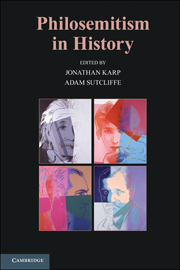Book contents
- Frontmatter
- Contents
- Notes on Contributors
- Introduction
- PART I MEDIEVAL AND EARLY MODERN FRAMEWORKS
- PART II THREE EUROPEAN PHILOSEMITES
- PART III THE CULTURAL POLITICS OF PHILOSEMITISM IN VICTORIAN BRITAIN AND IMPERIAL GERMANY
- 7 Bad Jew/Good Jewess
- 8 Anti-“Philosemitism” and Anti-Antisemitism in Imperial Germany
- 9 From Recognition to Consensus
- PART IV AMERICAN PHILOSEMITISMS
- PART V PHILOSEMITISM IN POST-HOLOCAUST EUROPE
- Index
- References
9 - From Recognition to Consensus
The Nature of Philosemitism in Germany, 1871–1932
Published online by Cambridge University Press: 05 June 2012
- Frontmatter
- Contents
- Notes on Contributors
- Introduction
- PART I MEDIEVAL AND EARLY MODERN FRAMEWORKS
- PART II THREE EUROPEAN PHILOSEMITES
- PART III THE CULTURAL POLITICS OF PHILOSEMITISM IN VICTORIAN BRITAIN AND IMPERIAL GERMANY
- 7 Bad Jew/Good Jewess
- 8 Anti-“Philosemitism” and Anti-Antisemitism in Imperial Germany
- 9 From Recognition to Consensus
- PART IV AMERICAN PHILOSEMITISMS
- PART V PHILOSEMITISM IN POST-HOLOCAUST EUROPE
- Index
- References
Summary
In its December 1931 issue the Prague publication Der Philosemit quoted the novelist Stefan Zweig to the effect that by its very nature philosemitism contains a “program.” “Philosemitism is a program,” Zweig insisted “if it constitutes the antithesis to antisemitism. Everything that is not destructive, uprooting, thoughtless should find a place here.” Featuring mainly non-Jewish contributors, Der Philosemit lauded the Jewish contribution to culture, praised the religious teachings of Judaism, exposed the lies of antisemites, and appealed to German-speaking Europe to acknowledge the Jews as part of the modern mosaic. We can hardly stop ourselves from looking up from this journal and glancing forward to 1933, when the Nazis seized power; to 1935, when the Nuremburg Laws made Judenfreundlichkeit a punishable crime; to Kristallnacht and to the crematoria. But with a concerted effort at side shadowing – at reading the past as more than a prologue to the present – we can look backward and try to explain how individuals and organizations in an antisemitic society came to champion the cause of Jews and Judaism. That is fundamentally what I tried to do in Between Philosemitism and Antisemitism: Defenses of Jews and Judaism in Germany, 1871–1932. In this essay I will put forward five broad observations that I drew from my research on philosemitism from the 1870s to the 1930s.
Information
- Type
- Chapter
- Information
- Philosemitism in History , pp. 190 - 208Publisher: Cambridge University PressPrint publication year: 2011
